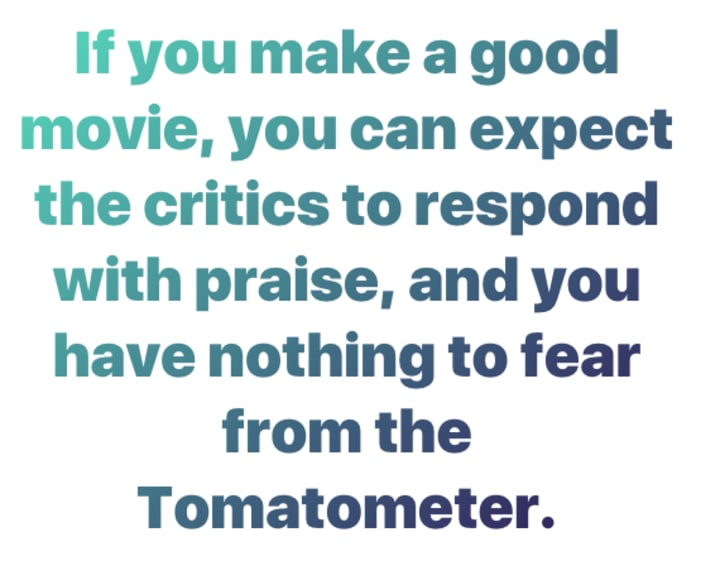
Launched in 1998 by web designer Senh Duong to catalog reviews for Jackie Chan movies, Rotten Tomatoes has become one of the most powerful forces in the modern film industry. Hollywood has recently blamed the review aggregate site on a series of box office flops, ranging from Baywatch to Pirates of the Caribbean: Dead Men Tell No Tales. As a result, studios are reportedly considering a breach with tradition, and may actually begin to deny critics early viewings of their films.
But how much power does Rotten Tomatoes really have? And how do we redress this balance of power?
How Does Rotten Tomatoes Work?
At its core, Rotten Tomatoes is a review aggregate site that collects reviews from recognized critics. It transforms these reviews into binary verdicts: positive or negative, or "fresh" and "rotten." As the site's representatives explain:
"At Rotten Tomatoes, we completely agree that film criticism is valuable and important, and we’re making it easier than it has ever been for fans to access potentially hundreds of professional reviews for a given film or TV show in one place. The Tomatometer score, which is the percentage of positive reviews published by professional critics, has become a useful decision-making tool for fans, but we believe it’s just a starting point for them to begin discussing, debating, and sharing their own opinions."
The problem is that, as the years have passed, Rotten Tomatoes has stopped being the "starting point" — it's become the driving force of discussion. In the case of Batman v Superman: Dawn of Justice, for example, the majority of critics scored the film at three stars. The Tomatometer's algorithm treats three stars as "rotten," and the movie wound up with a final score of just 27%. Fans were furious, and after Suicide Squad found itself in a similar situation, they launched a bizarre fan-petition to shut the site down!
Nowadays, the discussion of a film's quality isn't guided primarily by individual reviewers and critics; more and more often, the Tomatometer score is at the heart of the conversation. Take Wonder Woman. Everybody knows that the film has a rating of 93% on Rotten Tomatoes; but how many film fans can say what the critics actually liked about it?
Proponents of Rotten Tomatoes often point to certain exceptional films which have performed well in spite of poor scores on the Tomatometer. Indeed, certain franchises seems to have accumulated so much goodwill from fans that they're immune to the negative box office impact of a bad Tomatometer score. But here's the catch; whether you're talking Transformers or Resident Evil, these franchises tend to be predate the site's impact. The one real exception is the nascent #DCEU, but again, DC Comics have been around for decades, and certainly boasted a huge fan following before the advent of Rotten Tomatoes. In all these cases, it's likely the brand strength has, so far, protected the franchises from the impact of Rotten Tomatoes.
Meanwhile, though, there's a strong case for arguing that Rotten Tomatoes is failing the film critics too. As Brett Ratner (furious over Batman v Superman's reception) fumed:
"I have such respect and admiration for film criticism. When I was growing up film criticism was a real art. And there was intellect that went into that. And you would read Pauline’s Kael’s reviews, or some others, and that doesn’t exist anymore. Now it’s about a number."
He's right. The Tomatometer essentially converts a critic's thoughtful analysis into a basic binary score, with just a single sentence pulled out to represent their views. Worse, the site's layout often means fans get confused between critic and audience reviews; I've frequently seen fans railing against "the critics," when the review that ired them wasn't written by any recognized critic at all.
What Can We Do to Limit the Power of Rotten Tomatoes?
In 2015, an independent study commissioned by 20th Century Fox observed:
“The power of Rotten Tomatoes and fast-breaking word of mouth will only get stronger. Many Millennials and even Gen Xers now vet every single purchase through the internet, whether it’s restaurants, video games, make-up, consumer electronics, or movies. As they get older and comprise an even larger share of total moviegoers, this behavior is unlikely to change.”
They're right; the trend is clear, and the influence of Rotten Tomatoes will continue to grow. What can studios do in the face of this growing power?

The first, and most obvious, idea is a simple one: Hollywood can simply accept that culture has changed, and studios have to make better movies. Refusing to let critics view a film simply shows how little confidence a studio has in their movie.Wary of the bad press it had gotten over Batman v Superman and Suicide Squad, Warner Bros. was tempted not to allow critic viewings of Wonder Woman. Geoff Johns and Patty Jenkins believed in the film, and fought for critics' viewings — and the 93% Tomatometer score proves that their confidence was not misplaced. If you make a good movie, you can expect the critics to respond with praise, and you have nothing to fear from the Tomatometer.
The real answer lies with Rotten Tomatoes itself.
What Can Rotten Tomatoes Do To Fix Its Problems?
Rotten Tomatoes say they want to become a "starting point" for engagement with a film, and that's a laudable goal. But right now, I think they're failing in that mission. The review aggregate sites like Rotten Tomatoes (and, to a lesser extent, MetaCritic) have become the conversation. That needs to change.

My first recommendation would be to look again at the algorithm that drives the Tomatometer. It's concerning that a three-star review is treated the same as a one-star review, and both are viewed as equally "rotten." My second recommendation, though, is to look carefully at which reviews show up first on a movie's page, because this content undoubtedly steers the conversation and drives the users' actions.
Right now, individual movie pages begin with a trailer, then give you the critic and audience scores. Scroll down, and you have the option of booking tickets, then you get the chance to look at uploaded videos and images. The next boxes are related to information about the movie, the cast, and featured news and interviews. It's only at that point that you even get to the critic and audience reviews. The site's discussion forum is below even that. That page design deliberately prioritizes the site's content: the Tomatometer comes first, as an absolute value; it's followed by the movie's basic information; and finally, in third place, you get the actual statements from critics and audience members.
If the goal of Rotten Tomatoes is actually to be a "starting point" for discussion, then that page layout needs to change. Right now, the placement of the Tomatometer suggests that it's not just the jumping-off point; it's the whole conversation.
Ultimately, I'm not convinced that any review aggregate site should wield the power that Rotten Tomatoes does, but I also don't believe studios are the ones who can correct this. Rotten Tomatoes has the potential to turn itself into a force for good in the film industry, to actually become the "starting point" for discussion. But it needs to clean up its own act in order to achieve that lofty goal.
About the Creator
Tom Bacon
A prolific writer and film fan, Tom has a deep love of the superhero genre.






Comments
There are no comments for this story
Be the first to respond and start the conversation.